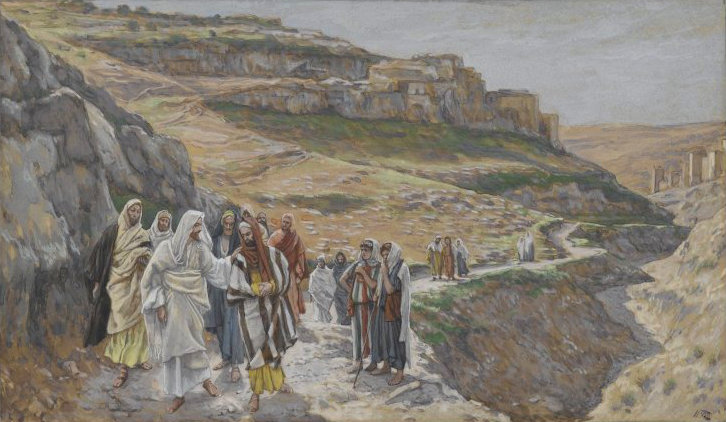Dear Brothers and Sisters,
 In a key scene in the movie A Few Good Men, defense lawyer Lieutenant Lionel Kaffee (portrayed by Tom Cruise) in cross-examining defendant Colonel Nathan Jessup (portrayed by Jack Nicholson), cries out: “I want the truth!” Colonel Jessup famously replies, “You can’t handle the truth!” Though we say we desire “the unvarnished truth,” what we often really want (as illustrated in the following joke) is truth that has been sugar-coated.
In a key scene in the movie A Few Good Men, defense lawyer Lieutenant Lionel Kaffee (portrayed by Tom Cruise) in cross-examining defendant Colonel Nathan Jessup (portrayed by Jack Nicholson), cries out: “I want the truth!” Colonel Jessup famously replies, “You can’t handle the truth!” Though we say we desire “the unvarnished truth,” what we often really want (as illustrated in the following joke) is truth that has been sugar-coated.
A fellow arrived home from the office just in time to receive a call from his wife who was about to fly home from Europe. “How’s my cat?” she asked. “Dead, he answered.” “Oh, honey, don’t be so honest. Why didn’t you break the news to me slowly? You’ve ruined my trip.” The semi-clueless husband replied, “What do you mean?” His wife gave him a bit of a tutorial by saying, “You could have told me he was on the roof. And when I called you from Paris, you could have told me he was acting sluggish. Then when I called from London, you could have said he was sick, and when I called you from New York, you could have said he was at the vet. Then, when I arrived home, you could have said he was dead.” Though never exposed to such protocol, the husband was willing to learn. “OK,” he said, “I’ll do better next time.” “By the way,” she asked, “How’s Mom?” After a long silence he said, “Uh, she’s on the roof.”
The Gospel accounts in the New Testament give examples of the disciples struggling to handle unvarnished truth. On several occasions, Jesus explained to them who he was and what was going to happen to him. At the Last Supper Jesus told them flat out, “I am the way and the truth and the life” (John 14:6). Earlier, he declared that if they would stay with him they would know the truth and this truth would set them free (John 8:32). Yet the disciples struggled to grasp what Jesus was telling them and to overcome their unbelief.

The struggle to understand and believe continues. Like the iconic scene in A Few Good Men, many people in our world can’t handle the truth, yet they want its benefits—particularly the freedom it provides. Unwilling to face the truth of God, they invent other “truths”—imagining other means, ways, rules and regulations they think will lead them to freedom. But Jesus declares that he is the truth; he alone sets us free. He tells us that there is no other way to true and free life except in right relationship with God and humankind in and through him.
Most of us have had our own struggles to “handle the truth.” But such struggles never deter Jesus. We may not be able to handle the truth, but the Truth knows how to handle us! Jesus not only sets us free, but promises never to leave or forsake us (Hebrews 13:5). He reassures us that no power or circumstance (not even our own doubts) can snatch us out of his protective hands (John 10:29).
Sometimes, seeking freedom, instead of paying attention to the authentic truth, people devise their own (erroneous) truths. Refusing to believe there are absolute truths that apply to everyone, all the time, they proclaim that truth is relative. Some even misconstrue the grace of God (and the true freedom it provides) as being without direction, boundaries, central norms and defining authority. For them, freedom is nothing more than freedom from any and all constraints—freedom to follow any inclination they may have at any particular moment. But such mistaken ideas grossly misrepresent what truth, freedom and grace are all about. Note what the apostle Peter wrote: “Live as people who are free, not using your freedom as a cover-up for evil, but living as servants of God” (1 Peter 2:16 ESV).
When Jesus declared that “the truth will set you free,” he was not talking about freedom to do whatever we want. He was declaring the mind of the God who, having designed and created us with a certain nature, gives us great purpose and the calling to live out that purpose throughout our lives. The triune God created us to live in a growing relationship with the Father, Son and Spirit by which we would be transformed into the fullness and stature of Jesus. God created us to be loved, and to love God and other people in ways that lead to an abundant life of true freedom—free to know God, to walk with God, to know the way, the truth and the life, to live the way that leads to peace and joy.
Yes, when the Son sets you free (and you live into that freedom), you are free indeed. The freedom God grants us in Christ, is freedom from and for specific things in accordance with God’s good design for us. That freedom runs in a particular direction. Whatever takes us off that path takes us away from the freedom God grants his children. Those other paths ultimately lead to slavery, not freedom.
Of course, there are times we fall from that narrow path—the way of eternal life that brings freedom—and we start walking down the broad and wide path that leads to destruction. But the good news is that Jesus brings us back. Not wanting us to be enslaved by our sinfulness; he reminds us that he is the truth, the one source of freedom. Note Paul’s words: “It is for freedom that Christ has set us free. Stand firm, then, and do not let yourselves be burdened again by a yoke of slavery” (Galatians 5:1). God doesn’t want obedient slaves—he wants children who live with him in freedom, grace and truth. He wants children who know what true freedom is—the freedom God has provided for us in Jesus.
In reading Scripture, we must keep in mind that Jesus is the ultimate source of truth and freedom. The Bible is rightly understood only when read through the “lens” of the life and teachings of Jesus as explained by those he appointed as his interpreters. Thomas Torrance put it this way:
We have no speech or language with which to address God but the speech and language called Jesus Christ. In him our humanity, our human understanding, our human words are taken up, purified and sanctified, and addressed to God the Father for us as our very own—and that is the word of man with which God is pleased (The Mediation of Christ).
Jesus is the truth spoken from on high; he also is the perfect human response to that truth. As Torrance wrote in Theological Science, Jesus is the truth “actualized from within the ontological depths of the fallen humanity he assumed in the incarnation.” Jesus Christ is both the objective revelation of God and the appropriate response and conformation of man to divine revelation. Jesus is the one human being in whom the truth of God and human knowledge of the truth “are fully and faithfully correlated.”
Torrance’s point is that Jesus is both the revelation of God to us and the response of humanity to God. The knowledge of this reality dispels the dangerous half-truth that says we need Jesus to bring us to God, but then it’s up to us to get to Jesus. If that were true, we would never get to Jesus! In fact, people say “no” to Jesus all the time. But thanks be to God, Jesus says “no” to our “no.” He knows we don’t understand what we’re saying “no” to. Jesus, who is the way, makes the way for us. The Holy Spirit convicts us that Jesus truly is Lord and Savior. Through the Spirit, Jesus seeks us out when we are lost, helpless, alone and unbelieving.
We don’t come to Jesus through our own efforts. Jesus, through the Spirit, finds us. And when we respond by coming to Jesus, he says, “Whoever comes to me I will never drive away” (John 6:37). As Jesus continues to say “no” to our “no,” he is reinforcing God’s big “yes” to humanity: Yes, you are forgiven. Yes, I accept you. Yes you are my dearly beloved child. God’s goal is that we will shout out our “yes” to him in response, understanding and embracing the truth that sets us free to be who we truly are in Christ.
It’s vital to understand that we can’t “handle” Jesus—he “handles” us! Jesus, through the Holy Spirit, welcomes and invites us to respond in a receptive way to him and to what he offers. Our triune God gives us the freedom we crave, but are incapable of achieving on our own. As C.S. Lewis notes, God grants this freedom by transforming us from the inside out:
Imagine yourself as a living house. God comes in to rebuild that house. At first, perhaps, you can understand what he is doing. He is getting the drains right and stopping the leaks in the roof and so on; you knew that those jobs needed doing and so you are not surprised. But presently he starts knocking the house about in a way that hurts abominably and does not seem to make any sense. What on earth is he up to? The explanation is that he is building quite a different house from the one you thought of—throwing out a new wing here, putting on an extra floor there, running up towers, making courtyards. You thought you were being made into a decent little cottage: but he is building a palace. He intends to come and live in it himself.
Now that’s truth we can handle!
Loving the Truth,
Joseph Tkach





